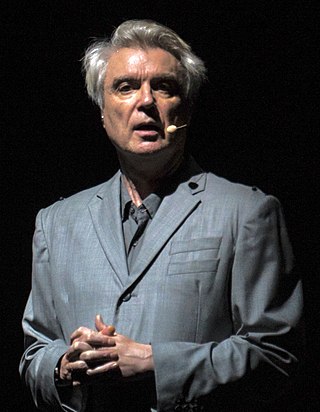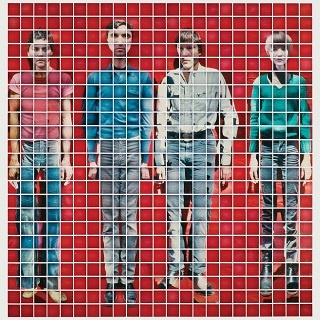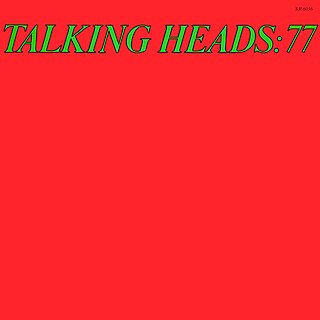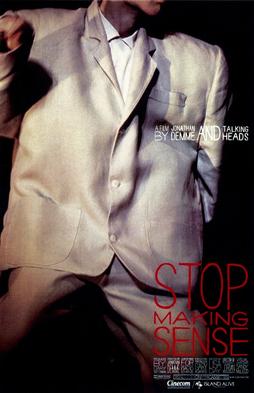Related Research Articles

Talking Heads were an American rock band that began performing under that name in 1975 in New York City. The band was composed of David Byrne, Chris Frantz (drums), Tina Weymouth (bass) and Jerry Harrison. Described as "one of the most critically acclaimed groups of the '80s," Talking Heads helped to pioneer new wave music by combining elements of punk, art rock, funk, and world music with "an anxious yet clean-cut image"; they have been called "a properly postmodernist band."

David Byrne is a Scottish-American musician, writer, visual artist, and filmmaker. He was a founding member, principal songwriter, lead singer, and guitarist of the American new wave band Talking Heads.

More Songs About Buildings and Food is the second studio album by the American rock band Talking Heads, released on July 14, 1978, by Sire Records. It was the first of three albums produced by collaborator Brian Eno, and saw the band move toward an increasingly danceable style, crossing singer David Byrne's unusual delivery with new emphasis on the rhythm section composed of bassist Tina Weymouth and her husband, drummer Chris Frantz.

Remain in Light is the fourth studio album by the American rock band Talking Heads, released on October 8, 1980, by Sire Records. The band's third and final album to be produced by Brian Eno, Remain in Light was recorded at Compass Point Studios in the Bahamas and Sigma Sound Studios in New York in July and August 1980.

Talking Heads: 77 is the debut studio album by the American rock band Talking Heads. It was released in September 1977 through Sire Records. The recording took place in April 1977 at New York's Sundragon Studios. The single "Psycho Killer" reached number 92 on the Billboard Hot 100.

Fear of Music is the third studio album by the American new wave band Talking Heads, released on August 3, 1979, by Sire Records. It was recorded at locations in New York City during April and May 1979 and was produced by Brian Eno and Talking Heads. The album reached number 21 on the Billboard 200 and number 33 on the UK Albums Chart. It spawned the singles "Life During Wartime", "I Zimbra", and "Cities".

Stop Making Sense is an independently produced 1984 American concert film featuring a live performance by the American rock band Talking Heads. The film was directed by Jonathan Demme and executive produced by Gary Kurfirst, the band’s longtime manager. The film was shot over four nights in December, 1983 at Hollywood’s Pantages Theatre while Talking Heads were on tour promoting their 1983 album, Speaking in Tongues. Stop Making Sense includes performances of the early Talking Heads single, "Psycho Killer" (1977), through to their most recent hit at the time, "Burning Down the House" (1983). It also includes songs from the solo career of frontman David Byrne and by Tom Tom Club, the side project of drummer Chris Frantz and bassist Tina Weymouth.

Speaking in Tongues is the fifth studio album by the American rock band Talking Heads, released on June 1, 1983, by Sire Records. After their split with producer Brian Eno and a short hiatus, which allowed the individual members to pursue side projects, recording began in 1982. It became the band's commercial breakthrough and produced the band's sole US top-ten hit, "Burning Down the House", which reached No. 9 in the Billboard Chart.

Boom Boom Chi Boom Boom is the third studio album by Tom Tom Club, released in 1988. It includes a cover of the Velvet Underground's "Femme Fatale", with David Byrne, Lou Reed, and Jerry Harrison. The track "Suboceana" was released as a single in the UK in late 1988 and received some radio airplay. In the US, a 12-inch single of the song was released, which featured a remix by Marshall Jefferson, and contains the track "Devil, Does Your Dog Bite". That song is a bonus on the Japanese issue of the album that has the original 10 songs. The track "Don't Say No" was released as a single in the UK, Europe, and Australia. The 7" version was remixed by Tuta Aquino and various 12" releases included acid house remixes by Marshall Jefferson. "Challenge of the Love Warriors" is played over the ending credits of Mary Lambert's 1987 mystery thriller Siesta though it is not included on the soundtrack album, also released in 1987, from Miles Davis and Marcus Miller.
"Circle Sky" is a song written by Michael Nesmith which appeared on The Monkees' sixth album, the Head soundtrack, and also in the film Head as a live concert performance.

"This Must Be the Place (Naive Melody)" is a song by new wave band Talking Heads. The closing track of their fifth studio album Speaking in Tongues, it was released in November 1983 as the second and final studio single from the album; a live version would be released as a single in 1986. The lyrics were written by frontman David Byrne, and the music was written by Byrne and the other members of the band, Chris Frantz, Tina Weymouth and Jerry Harrison.

"Genius of Love" is a 1981 hit song by American new wave band Tom Tom Club from their 1981 eponymous debut studio album. The song reached number one on the Billboard Disco Top 80 chart, and was performed by Talking Heads in the 1984 concert film Stop Making Sense.

No Talking, Just Head is the only studio album by the Heads, a band composed of Jerry Harrison, Tina Weymouth, and Chris Frantz of Talking Heads, joined by a variety of guest singers. Released in October 1996, the project was commercially and critically unsuccessful. The band members went on to pursue other musical interests.

"Psycho Killer" is a song by American rock band Talking Heads, released on their debut studio album Talking Heads: 77 (1977). The group first performed it as the Artistics in 1974.

Storytelling Giant is a 1988 compilation album of music videos by Talking Heads during the 1980s. The videos are linked by real people telling stories from their lives; the stories have no logical connection to the videos.

"Burning Down the House" is a song by new wave band Talking Heads, released in July 1983 as the first single from their fifth studio album Speaking in Tongues.

Stop Making Sense is a live album by the American rock band Talking Heads, also serving as the soundtrack to the concert film of the same name. It was released in September 1984 and features nine tracks from the film, albeit with treatment and editing. The album spent over two years on the Billboard 200 chart. It was their first album to be distributed by EMI outside North America.

Plants and Birds and Rocks and Things was the 1993 debut album by the Loud Family, a band formed by singer, songwriter and guitarist Scott Miller after the dissolution of his 1980s band Game Theory. It was Miller's fifth album to be produced by Mitch Easter.

"I Zimbra" is a song by American new wave band Talking Heads, released as the second single from their 1979 album Fear of Music.

"Cities" is a single, released in 1980, by the American new wave band Talking Heads. It is the fourth track on the 1979 album Fear of Music.
References
- ↑ Gittins 2004, p. 39.
- 1 2 Irvin, Jim (2007). The Mojo Collection: The Ultimate Music Companion (4th ed.). Canongate Books. p. 409. ISBN 978-1-84195-973-3.
- ↑ Katz, Mike; Kott, Crispin (2018). Rock and Roll Explorer Guide to New York City. Globe Pequot Press. p. 196. ISBN 978-1-63076-316-9.
- ↑ Simels, Steve (1978). "Stereo Review". Stereo Review . Vol. 41. p. 148.
- ↑ Gittins 2004, p. 39–40.
- ↑ Segretto, Mike (2022). 33 ⅓ Revolutions Per Minute: A Critical Trip Through the Rock LP Era, 1955–1999. Backbeat Books. p. 356. ISBN 978-1493064595.
- ↑ Matos, Michaelangelo (2020). Can't Slow Down: How 1984 Became Pop's Blockbuster Year. Hachette Books. ISBN 978-0306903373.
- ↑ "Vital Reissues". Billboard . Vol. 111, no. 35. August 28, 1999. p. 26. ISSN 0006-2510 . Retrieved October 4, 2023.
Bibliography
- Gittins, Ian (2004). Talking Heads: Once in a Lifetime: The Stories Behind Every Song. Hal Leonard. ISBN 978-0634080333.